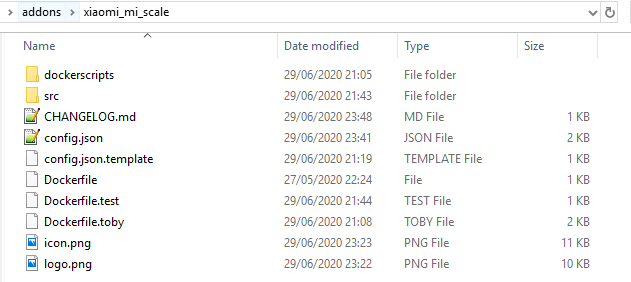Xiaomi Mi Scale Add On for Home Assistant
Add-On for HomeAssistant to read weight measurements from Xiaomi Body Scales.
Supported Scales:
| Name | Model | Picture |
|---|---|---|
| Mi Smart Scale 2 | XMTZC04HM |  |
| Mi Body Composition Scale | XMTZC02HM |  |
| Mi Body Composition Scale 2 | XMTZC05HM |  |
Setup
-
Retrieve the scale's MAC Address based on the Xiaomi Mi Fit app.
-
Clone this repository
git clone https://github.com/lolouk44/xiaomi_mi_scale_ha_add_on -
Create a new directory xiaomi_mi_scale in the folder addons in your Home Assistant installation and place all files in it via SSH / Samba
-
Open Home Assistant and navigate to add-on store and clock the reload button on the top right corner. Now you should see the Xiaomi Mi Scale as a local add-on

-
Install the add-on (takes a while as the container is built locally)
-
Edit the Configuration
| Option | Type | Required | Description |
|---|---|---|---|
| HCI_DEV | string | No | Bluetooth hci device to use. Defaults to hci0 |
| MISCALE_MAC | string | Yes | Mac address of your scale |
| MQTT_PREFIX | string | No | MQTT Topic Prefix. Defaults to miscale |
| MQTT_HOST | string | Yes | MQTT Server (defaults to 127.0.0.1) |
| MQTT_USERNAME | string | No | Username for MQTT server (comment out if not required) |
| MQTT_PASSWORD | string | No | Password for MQTT (comment out if not required) |
| MQTT_PORT | int | No | Defaults to 1883 |
| TIME_INTERVAL | int | No | Time in sec between each query to the scale, to allow other applications to use the Bluetooth module. Defaults to 30 |
| MQTT_DISCOVERY | bool | No | MQTT Discovery for Home Assistant Defaults to true |
| MQTT_DISCOVERY_PREFIX | string | No | MQTT Discovery Prefix for Home Assistant. Defaults to homeassistant |
Auto-gender selection/config -- This is used to create the calculations such as BMI, Water/Bone Mass etc... Up to 3 users possible as long as weights do not overlap!
| Option | Type | Required | Description |
|---|---|---|---|
| USER1_GT | int | Yes | If the weight is greater than this number, we'll assume that we're weighing User #1 |
| USER1_SEX | string | Yes | male / female |
| USER1_NAME | string | Yes | Name of the user |
| USER1_HEIGHT | int | Yes | Height (in cm) of the user |
| USER1_DOB | string | Yes | DOB (in yyyy-mm-dd format) |
| USER2_LT | int | No | If the weight is less than this number, we'll assume that we're weighing User #2 |
| USER2_SEX | string | No | male / female |
| USER2_NAME | string | No | Name of the user |
| USER2_HEIGHT | int | No | Height (in cm) of the user |
| USER2_DOB | string | No | DOB (in yyyy-mm-dd format) |
| USER3_SEX | string | No | male / female |
| USER3_NAME | string | No | Name of the user |
| USER3_HEIGHT | int | No | Height (in cm) of the user |
| USER3_DOB | string | No | DOB (in yyyy-mm-dd format) |
- Start the add-on
Home-Assistant Setup:
Under the sensor block, enter as many blocks as users configured in your environment variables:
- platform: mqtt
name: "Example Name Weight"
state_topic: "miScale/USER_NAME/weight"
value_template: "{{ value_json['Weight'] }}"
unit_of_measurement: "kg"
json_attributes_topic: "miScale/USER_NAME/weight"
icon: mdi:scale-bathroom
- platform: mqtt
name: "Example Name BMI"
state_topic: "miScale/USER_NAME/weight"
value_template: "{{ value_json['BMI'] }}"
icon: mdi:human-pregnant
Acknowledgements:
Thanks to @syssi (https://gist.github.com/syssi/4108a54877406dc231d95514e538bde9) and @prototux (https://github.com/wiecosystem/Bluetooth) for their initial code
Special thanks to @ned-kelly for his help turning a "simple" python script into a fully fledged docker container
Thanks to @bpaulin for his PRs and collaboration


